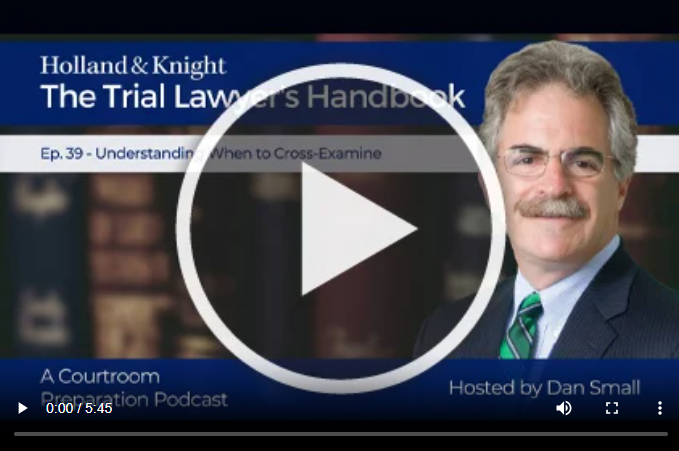In this episode of "The Trial Lawyer's Handbook" podcast series, litigation attorney Dan Small shares the importance of understanding when to cross-examine. Mr. Small highlights the challenges that come with cross-examination and seven thoughts to consider before taking action.
Listen and subscribe on Amazon.
Listen and subscribe on Apple Podcasts.
Listen and subscribe on SoundCloud.
Listen and subscribe on Spotify.
Watch and subscribe on YouTube.
Mr. Small is also the author of the new American Bar Association (ABA) book Lessons Learned from a Life on Trial: Landmark Cases from a Veteran Litigator and what They Can Teach Trial Lawyers.
Podcast Transcript
Dan Small: Thanks to movies and television, many lawyers seem to believe that a vigorous, aggressive, nasty cross-examination is essential. The truth is very much the opposite. Cross-examination may be the most interesting part of a trial, and the most fun, at least when things are working right. But it's also the most challenging and the most dangerous, and should be undertaken, if at all, with great care.
What makes cross so challenging? To begin with, you're examining a witness who is almost always unfriendly, and occasionally outright hostile. So you're usually trying to elicit helpful information from someone who doesn't want to be helpful. You're usually trying to control someone who doesn't want to be controlled. And because of that, if you're not careful, cross-examination can be risky.
The most obvious risk is that you may elicit harmful testimony. It's particularly painful to have a witness say something damaging on cross that didn't come out on direct. Now here you are trying to destroy the witness, and instead you've destroyed your case. Even if you don't step on the land mine, you can still undermine your case with a weak or ineffective cross. It isn't helpful, for example, simply to repeat your opponent's evidence or to irritate the jury and judge by quarreling with the witness, or to wallow in tedious detail, or to waste everyone's time by asking the same questions over and over, unless it's intentional and strategic. In short, lots of things can go wrong on cross-examination.
Don't let yourself be seduced by the allure of trying to win the case through a killer cross-examination. Save that for your dreams. Before you say a word, ask yourself, is this likely to work? Is the potential gain worth the risk? And if I try it, how do I minimize that risk? Put another way, the first rule of cross-examination is actually the same as the first rule of medicine: First, do no harm. So before you start your cross, think about some of the following.
Number one: has a witness really hurt you? If it ain't broke, don't fix it. If the witness hasn't hurt you, why are you doing this? Maybe he'll hurt you on cross-examination instead.
Number two: Is a witness' testimony something that truly matters? Are you just going to wind up emphasizing something minor or even trivial, turning it into something major?
Number three: Can you realistically get the witness to give any testimony favorable to your case? Or are you more likely to have a witness repeat or emphasize something negative?
Number four: Was the witness credible? Be honest with yourself. If he was credible or she was credible, do you have anything to work with to attack his or her credibility? If not, could you inadvertently buttress the witness' testimony against you?
Number five: Are you confident that you know how the witness will answer your questions? Don't ask a question you don't know the answer to is a commandment, a basic commandment, for cross-examination.
Number six: Is this cross-examination actually going to add anything to your closing argument? That, after all, is the point of cross-examination: to give you food to use in in your closing argument.
Number seven: Is there an alternative way to respond, like using another witness?
If you do decide to cross, have a strategy and a goal. The strategy doesn't have to be complex. It could be as simple as show the witness is lying or show the witness couldn't see or didn't see. Still, you need to think carefully about where you want to go and how you expect to get there. You also need to think about where you will be if your strategy doesn't work, or only gets you part of the way to where you want to go. Sometimes the most effective cross is two words, or four, actually: No questions, your Honor.
If you've scored your basic points, sit down. Don't press your luck. At the very least, you haven't harmed your credibility. You haven't strengthened your opponent's case, and you haven't wasted everyone's time. When in doubt, don't do it. If you aren't sure whether to conduct a cross-examination, take a pass. Dismiss the witness with a confident dare and move on.
The content of this article is intended to provide a general guide to the subject matter. Specialist advice should be sought about your specific circumstances.


